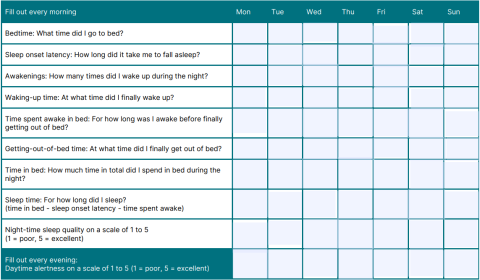Self-help program
4. Sleep diary
Keeping a sleep diary is an important exercise in its own right. In addition, it also helps you to track the progress of your other exercises.
Your sleep diary can tell you
- how the quantity and quality of your sleep vary from one night to the next
- what factors affect your sleep and alertness levels
Keeping a sleep diary is easy. All you need is a notebook or your computer or smartphone.
Start each morning by recording the previous night’s sleep in your diary. In the evening, record any observations that you have made about your alertness levels during the day or any factors that could affect your sleep.
Exercise: Sleep diary
Goal
Start a sleep diary and write in it every day.
Instructions
Write down your observations about your night’s sleep as soon as you wake up in the morning. Also update your sleep diary every evening with anything relevant that occurred during the day.
The most important thing about a sleep diary is writing in it regularly.
It can take a while before you start to see the benefits. That is why we recommend that you do this exercise on your own, using the notes app on your phone, a physical notebook or the PDF template provided at the bottom of this page.
Below you will find the questions that you should be answering in your diary as well as an image to show you the structure of the diary.
- Bedtime: What time did I go to bed?
- Sleep onset latency: How long did it take me to fall asleep?
- Awakenings: How many times did I wake up during the night?
- Waking-up time: At what time did I finally wake up?
- Time spent awake in bed: For how long was I awake before finally getting out of bed?
- Getting-out-of-bed time: At what time did I finally get out of bed?
- Time in bed: How much time in total did I spend in bed during the night?
- Sleep time: For how long did I sleep? Instructions: Your sleep time is the time you spent in bed minus the sleep onset latency and time spent awake. For example, if you were in bed for nine hours, but it took you an hour to fall asleep and then 30 minutes to get out of bed in the morning, your sleep time is 7.5 hours.

